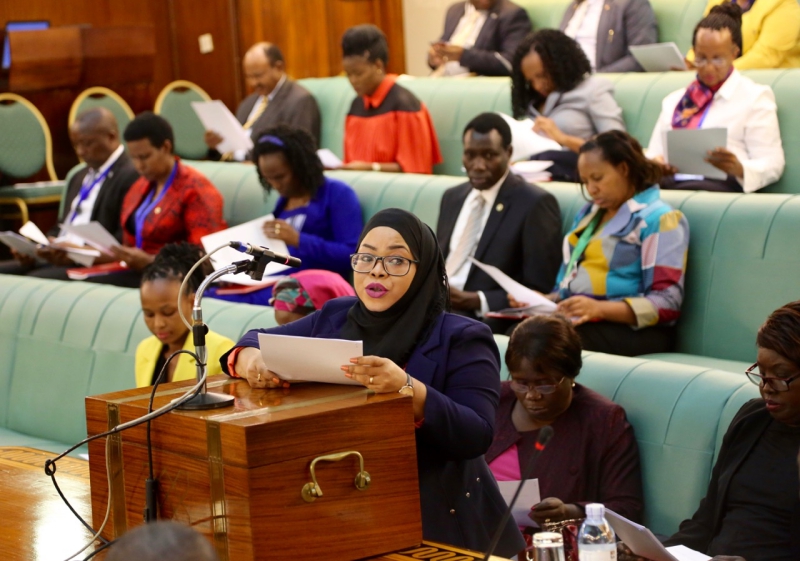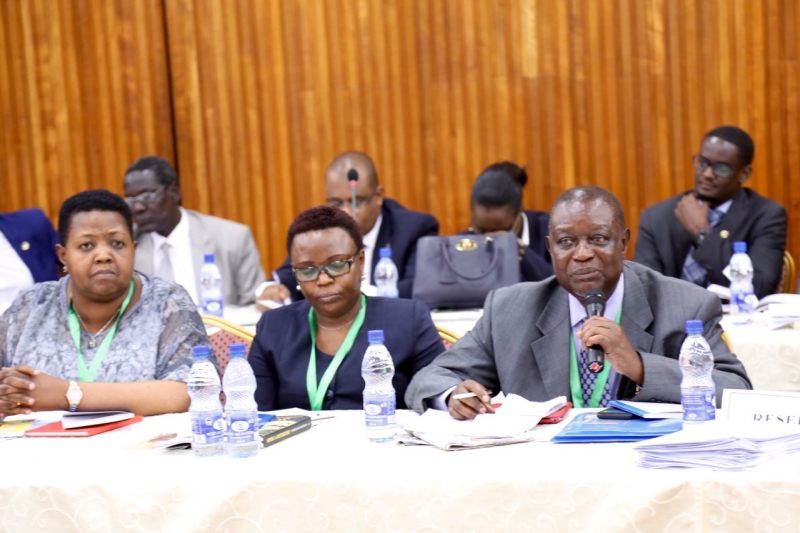
Posted in Press Release
East African Legislative Assembly, Kampala, Uganda: January 30th 2018:
EALA at Plenary this morning approved Members to its six Standing Committees. In accordance with the provisions of Rules 79 and 80 of the Rules of Procedure, the Members are to serve in the respective Committees for a period of two and a half years to enable the Assembly to effectively discharge its functions.
Each Committee has 18 Members and each Member belongs to at least two Committees. The six Committees are the Accounts, Agriculture, Tourism and Natural Resources (ATNR) and the that of Communication, Trade and Investment (CTI). Others are the General Purpose Committee (GPC), the Legal Rules and Privileges Committee and the Committee on Regional Affairs and Conflict Resolution (RACR).
The motion to appoint the Members of the Standing Committee was moved by Hon Maryam Ussi and seconded by Hon Arol Garang Gabriel and Hon Susan Nakawuki Nsambu. The resolution avers that in accordance with the provisions of Section 4(b) of the Administration of EALA Act, 2012 and Rule 83(5)(b) the Commission nominates Members of Standing Committees, a move that took place in December 2017.
Prior to the move, another motion moved by Hon Fancy Nkuhi sought to suspend Rule 80(6) of the Rules of Procedure to provide for the appointment of all Members to the House. At the moment, the Rule provides for only 15 Members of the House – which negates the principle of Rule 80 (5). Currently, there are six Partner States with the recent entry of the elected Members from the Republic of South Sudan. Consequently, the Members agreed that the suspended rule be referred to the Committee on Legal Rules and Privileges for further scrutiny and amendment therefrom. The motion received support on the floor of the House.
Immediately thereafter, the Members elected respective Chairpersons to the Committees to preside over their activities. Hon Dr Jumanne Ngwaru Maghembe will chair the Accounts Committee, Hon Deng Gai, the Communications, Trade and Investment Committee and Hon Mathias Kasamba, the Agriculture, Tourism and Natural Resources Committee. The General Purpose Committee is to be chaired by Hon Abdikadir Aden while Hon Amb Fatuma Ndangiza will chair the Legal Rules and Privileges Committee. On his part, Hon Victor Burikukiye shall preside over the Regional Affairs and Conflict Resolution Committee.
The Committees are set to benefit from a three-day induction process beginning this afternoon.
Article 49(2)( e) provides that the Assembly may for purposes of carrying out its functions, establish any Committee or Committees for such purposes as it deems necessary.
NOTE TO EDITORS
The following are the Members of the various Committees:
- MUHIA Wanjiku
- ADEN Omar Abdikadir
- KALONZO Musyoka Kennedy
- KIMBISA Adam Omar
- Dr. MAGHEMBE Ngwaru Jumanne
- NKUHI Fancy Haji
- LUGIKO Happiness Elias
- GARANG Alaak Gabriel
- Dr. AROL Garang Aher Gabriel
- AYASON Mukulia Kennedy
- GASINZIGWA Oda
- RWIGEMA Pierre Celestin
- BARIMUYABO Jean Claude
- AKOL Rose
- NAMARA Dennis
- NAKAWUKI Susan Nsambu
- RURAKAMVYE Pierre Claver
- NDUWAYO Christopher
- BURIKUKIYE Victor
- AGRICULTURE, TOURISM AND NATURAL RESOURCES COMMITTEE
- NOORU Adan Mohammed
- ALI Ibrahim Fatuma
- Dr. OBURU Oginga
- LEMOYAN Josephine Sebastian
- Eng. MNYAA Mohammed Habib
- KIMBISA Adam Omar
- Dr. LEONARDO Itto Anne
- Dr. AROL Garang Aher Gabriel
- Dr. WODA Odok Jeremiah
- BAHATI Alex
- RWIGEMA Pierre Celestin
- UWUMUKIZA Francoise
- KASAMBA Mathias
- OPOKA-OKUMU Christopher
- MUGYENYI Mary
- NSAVYIMANA Sophie
- AHINGEJEJE Alfred
- KARERWA Mo-Mamo
- COMMUNICATION, TRADE AND INVESTMENT COMMITTEE
- ABURI Mpuru Lawrence
- MBUGUA Nganga Simon
- SERGON Jematiah Florence
- LUGIKO Happiness Elias
- Eng. MAASAY Pamela Simon
- Eng. MNYAA Mohammed Habib
- THOAR Gatpan Gideon
- DENG Gai
- Dr. WODA Odok Jeremiah
- RUTAZANA Francine
- BAHATI Alex
- BARIMUYABO Jean Claude
- MUKASA Mbidde Fred
- MUSAMALI Mwasa Paul
- KASAMBA Mathias
- RURAKAMVYE Pierre Claver
- NSAVYIMANA Sophie
- BURIKUKIYE Marie Claire
- GENERAL PURPOSE COMMITTEE
- ADEN Omar Abdikadir
- NOORU Adan Mohamed
- SERGON Jamatiah Florence
- Eng. MAASAY Pamela Simon
- Dr. MAKAME Abdullah Hasnuu
- USSI Yahya Maryam
- GATKEK Dut Thomas
- DUOP Kim Gai Ruot
- AYASON Mukulia Kennedy
- Dr. KALINDA Francois Xavier
- GASINZIGWA Oda
- UWUMUKIZA Francoise
- NAMARA Dennis
- ODONGO George Stephen
- OPOKA-OKUMU Christopher
- KARERWA Mo-Mamo
- NDUWAYO Christopher
- NZEYIMANA Leontine.
- LEGAL, RULES AND PRIVILEGES COMMITTEE
- ALI Ibrahim Fatuma
- KALONZO Musyoka Kennedy
- MUHIA Wanjiku
- LUGIKO Happiness Elias
- USSI Maryam Yahya
- LEMOYAN Josephine Sebastian
- Dr. LEONARDO Itto Anne
- DENG Gai
- DUOP Kim Gai Ruot
- NDANGIZA Fatuma
- KALINDA Francois Xavier
- RUTAZANA Francine
- MUKASA Mbidde Fred
- MUSAMALI Mwasa Paul
- NAKAWUKI Susan Nsambu
- AHINGIJEJE Alfred
- MUHIRWA Jean Marie
- BURIKUKIYE Marie Claire
- REGIONAL AFFAIRS AND CONFLICT RESOLUTION
- ABURI Mpuru Lawrence
- Dr. OBURU Oginga
- MBUGUA Nganga Simon
- Dr. MAGHEMBE Ngwaru Jumanne
- Dr. MAKAME Abdullah Hasnuu
- NKUHI Fancy Haji
- THOAR Gatpan Gideon
- GATKEK Dut Thomas
- GARANG Alaak Gabriel
- NDANGIZA Fatuma
- RWIGEMA Pierre Celestin
- RUTAZANA Francine
- MUGYENYI Mary
- ODONGO George Stephen
- AKOL Rose
- MUHIRWA Jean Marie
- BURIKUKIYE Victor
- NZEYIMANA Leontine.
Section 4 of the EALA Administration Act
- Under Section 4 and Rule 83(4) (b) of the Rules of Procedure, the Commission is charged with the responsibility of nominating Members of Standing Committees.
- ENDS -
For more information, please contact:
Bobi Odiko
Senior Public Relations Officer
East African Legislative Assembly
Arusha, Tanzania
Tel: +255-27-2508240
Fax: +255-27-2503103
Cell: +255-787-870945, +254-733-718036
Email: BOdiko [at] eachq.org
Web: www.eala.org
About the East African Legislative Assembly:
The East African Legislative Assembly (EALA) is the Legislative Organ of the Community and has a cardinal function to further EAC objectives, through its Legislative, Representative and Oversight mandate. It was established under Article 9 of the Treaty for the Establishment of the East African Community.

Posted in Press Release
East African Legislative Assembly, Kampala, Uganda: January 27th 2018:
Eminent East Africans have stepped up calls for further strengthening of the regional Assembly and the integration process as the week-long induction programme of the new Members ended in Kampala.
The Speaker Emeritus (2nd Assembly) of EALA, Rt Hon Abdirahin Abdi challenged the 4th EALA to push for its autonomy if it is to effectively undertake its mandate. Rt Hon Abdi is categorical that administrative and financial autonomy will give the regional Assembly the much- needed impetus and space to drive the integration process.
In his paper entitled, “Thoughts and Experiences, Lessons learnt and recommendations about the operations of EALA and the EAC in General”, Rt Hon Abdi implored the legislators to take advantage of the provisions of the Treaty in the quest to re-energise the workings of EALA. “I urge you to generate your own work and to demand Council reports in line with Provisions of Article 49(2) (d) and 59 of the Treaty”, he said.
The former Speaker also added that the decisions of the Assembly were determined by majority vote and thus EALA should not be bogged down by the principle of consensus.
The former Speaker who presided over EALA during the period June 2007-2012, told the legislators not only to prioritise key activities – but to allocate the resources in the same direction.
On his part, immediate former Speaker of the 3rd Assembly, Rt Hon Daniel F. Kidega called on new Members to spend time on research in order to effectively contribute to the debates in the house from a standpoint of information. He reiterated the need for Members to effectively utilize the Committees – which he said, make significant contribution to the work of the Assembly.
He maintained that as a regional legislature, it was necessary for Members to avoid taking country positions in the debates but rather to embrace the regional standpoint. “The idea of integrating EAC and the region must always be the bigger picture”, Rt Hon Kidega said.
Rt Hon Kidega also urged the new legislators to embrace financial discipline and decorum in their work.
Addressing the House, former EAC Secretary General, Hon Amanya Mushega said the original EAC took off on a sure footing – but various reasons hinged on different political ideologies led to its collapse. “The memories of the old Community however lingered on since there were real tangible benefits”, he said, leading to efforts to revive it. Other factors such as globalization, the need for wider markets as well as the historical and political ties also played a key part in revival strategies, Hon Mushega stated.
The former Secretary General called for inculcation of confidence building measures as a stepping stone to real integration and said the Community is supposed to be people-centred and private sector driven. He however lamented that more needs to be done to spark a conducive environment for the private sector to thrive. Hon Mushega also said the dictates of good governance and adherence to universal principles of human rights should be adhered to.
On the question of whether the current EAC is on track, the former Secretary General retorted that: for the better part, the EAC had remained on track. However, the question of timing and speed was of the essence.
Other personalities who addressed the House were, Hon Dora Byamukama, former Member whose remarks delved on the practical application of the Rules of Procedure by Members and experiences in introducing Private Members’ Bills, while the former EAC Principal Legislative Draftsman, Lawrence Kamugisha spoke on Understanding the Laws of the East African Community.
Yesterday, EALA Members are in West Nile Arua district to join on the occasion of the 32nd NRM Liberation Day. H.E. President Yoweri Museveni led the celebrations.
NOTE TO EDITORS
Article 49(2) (d) of the Treaty for the East African Community states that:
The Assembly shall discuss all matters pertaining to the Community and make recommendations to the Council as it may deem necessary for the implementation of the Treaty.
Article 59 (1) States that
Subject to the rules of procedure of the Assembly, any member may propose any motion or introduce any Bill in the Assembly:Provided that a motion which does not relate to the functions of the Community shall not be proposed in the Assembly, and a Bill which does not relate to a matter with respect to which Acts of the Community may be enacted shall not be introduced in the Assembly
- ENDS -
For more information, please contact:
Bobi Odiko
Senior Public Relations Officer
East African Legislative Assembly
Arusha, Tanzania
Tel: +255-27-2508240
Fax: +255-27-2503103
Cell: +255-787-870945, +254-733-718036
Email: BOdiko [at] eachq.org
Web: www.eala.org
About the East African Legislative Assembly:
The East African Legislative Assembly (EALA) is the Legislative Organ of the Community and has a cardinal function to further EAC objectives, through its Legislative, Representative and Oversight mandate. It was established under Article 9 of the Treaty for the Establishment of the East African Community.

